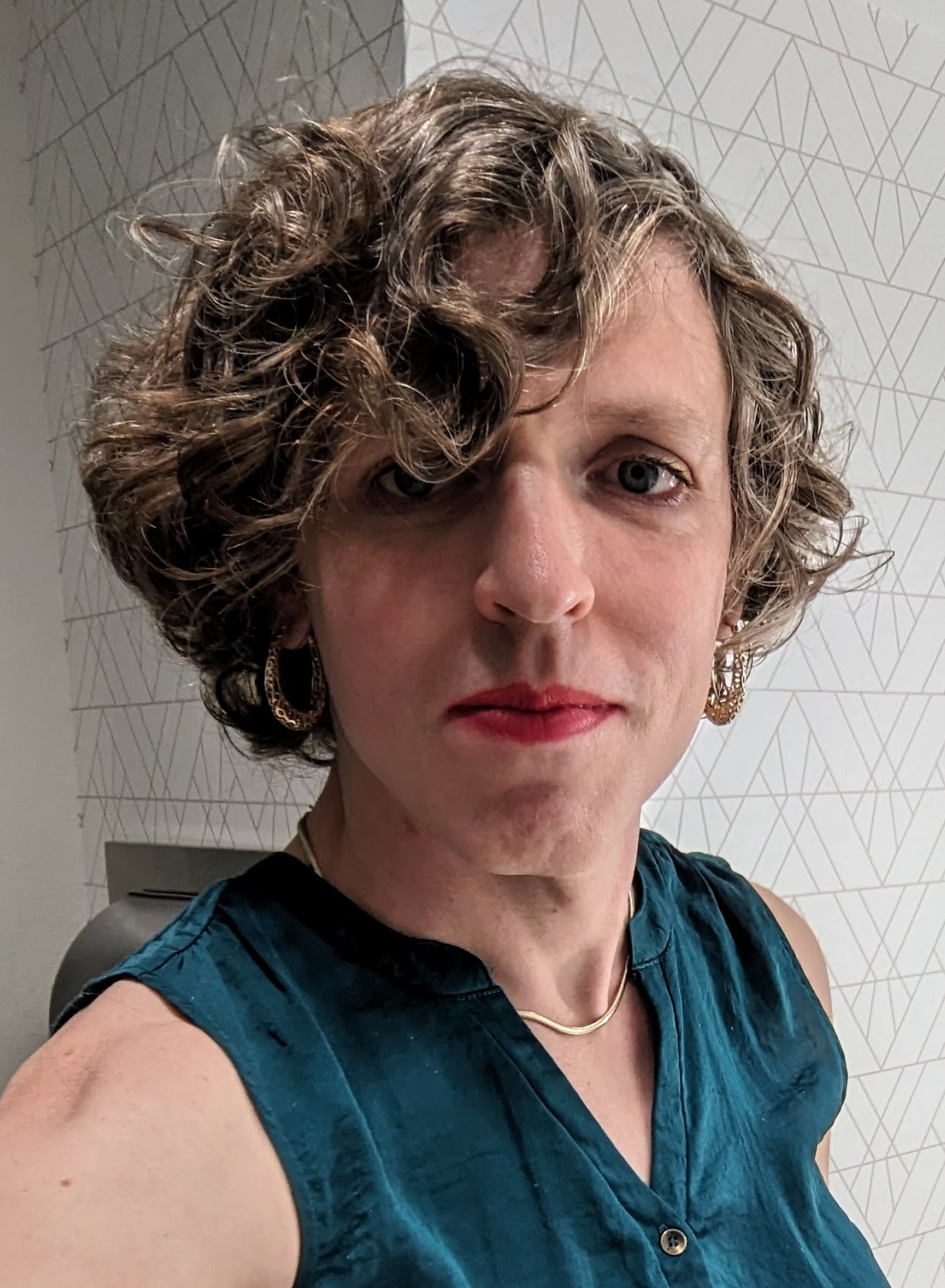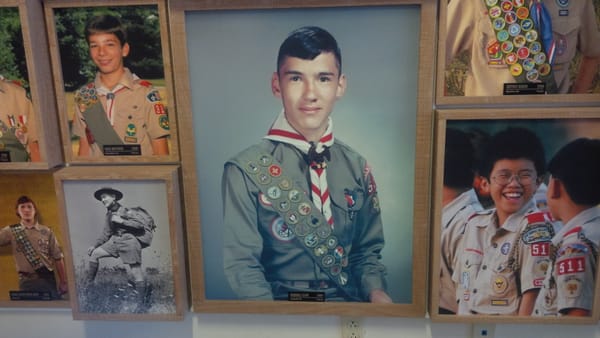'I don’t really care if you don’t like who I am. I’ve got a camping trip to plan'
Emily Kelly is openly trans. But when she's leading her Cub Scout pack, that's the last thing on her mind.

A few months ago, Emily Kelly, the leader of a Cub Scout pack in the Atlanta area, walked into her local council service center to take care of some paperwork, so to speak.
She approached the counter and told the clerk she needed to change her name in the system. “Okay, we can do that,” the clerk replied. “While you’re in there, can you change the gender, too?” Kelly asked, expecting to face some resistance or, at the very least, a raised eyebrow. But the clerk didn’t flinch: “Yeah, no problem,” they said.
Just like that, the records at Kelly’s council office now reflected a transition she had made the year prior, to living as an openly trans woman. “Imagine if I tried to do that five years ago,” Kelly said.
The ease with which Kelly has embraced her gender identity within Scouting is, indeed, a significant marker of progress. Leading a Cub Scout pack as an openly trans woman in the South might seem like a radical act. But for cubmaster Kelly—and the scouts in her unit—it’s not really a big deal at all.
“At a local level, I don’t want to be a trans advocate within Scouting,” Kelly told me. “I would like for the families in my pack to just see me as a scout leader.”
And for the most part, they do. When Kelly shared her gender identity with parents last year (with the blessing of local scout leadership), it caused little more than a ripple. Her experience shows how, despite a vitriolic national debate over gender, trans people’s identities need not be controversial. Even in traditionally conservative spaces like the Boy Scouts of America, trans people can live their truth in a way that is completely unremarkable.
In fact, Kelly doesn’t spend much time at scout meetings dwelling on her gender identity at all. “I don’t really care if you don’t like who I am,” she said. “I’ve got a camping trip to plan.”
A life spent in Scouting
Emily Kelly, like so many of us, first joined Cub Scouts because her older brother and father were already involved. “Someone in the family already did it, so [they] just signed me up,” she said. Her mom became Kelly’s den leader, and she sailed through the program to earn her Arrow of Light.
When she graduated into Boy Scouts, Kelly “didn’t always love it the first few years,” she said. “I was not the most outdoorsy kid.” She felt the best thing to do was race through the ranks as quickly as possible so she could be done with it. Kelly earned her eagle scout rank by 9th grade, right before she departed on a study abroad program in France. “Then I came back and I was like, I kind of missed that,” she said.
So she jumped back into Scouting, earning eagle palms, serving as senior patrol leader, becoming an officer with her Order of the Arrow lodge. She didn’t stop when she got to college, either. Her freshman year, she became a vigil honor member of the OA, and even started an unofficial lodge chapter on the campus of Georgia Tech with another Scouting friend.
Every semester, Kelly lead the chapter on service projects and camping trips, and often brought the group to volunteer at local OA events. Along the way, Kelly has also checked off nearly every Scouting experience you can think of: Philmont, Northern Tier, Jamboree, International Jamboree, NOAC and Wood Badge, to name a few.
She didn’t take a real break from Scouting until a few years after college, when she had kids of her own. But that was also the reason Kelly eventually came back to the program, when her daughter wanted to join Cub Scouts. Kelly started as her den leader, and soon became the unit’s cubmaster. That was four years ago; her daughter is now working on her Arrow of Light, and her younger son is working on Bear.
“Scouting has been a big part of my life for 30 years now,” Kelly said.
‘I should do something about this’
When the Covid-19 pandemic sent the world into lockdown, it gave many people an unexpected break from everyday routines—and time to reflect on what they wanted out of life.
This pause allowed Kelly to finally start grappling with her gender identity in a serious way. “Looking back, I knew something wasn’t quite cisgender about me for a while,” she said. With the help of therapy, she realized she was a trans woman, and thought to herself, “I should do something about this.”
One of her first steps was to call a meeting with the leaders of her local scout units. “Hey, I’ve got some interesting news for you,” she joked, sharing that she had transitioned. Not wanting to impose any difficulty on the leadership, she gave them several options:
- She could remain in “boy mode,” as she called it, until the end of the school year, then find a replacement cubmaster to take over for the following year.
- She could step down as cubmaster immediately, though she noted there was no obvious replacement, so this option could significantly hurt the pack.
- She could come out as trans immediately, sharing the news with the pack with the support of its leadership.
The response stunned her: “They said, ‘We don’t see why you wouldn’t just come out,’” Kelly told me. The pack’s chartered organization was a Methodist church—a denomination not always known for LGBTQ acceptance—but this particular congregation fully supported queer and trans people, so that wasn’t an issue. As for the council, the committee chair called to confirm it was okay, and it was.
So over the holiday break that year, Kelly sent an email to parents in the cub pack. “I know this is new for a lot of people,” she wrote. “Frankly, it’s new for me.” She explained that she wasn’t asking parents to do anything differently; she simply wanted to give them a heads up that she might “look a little different” at the next meeting.
The response was overwhelmingly positive. Out of about 100 families in the pack, Kelly estimates that five left as a direct result of her coming out. While Kelly was disappointed to see them go, she was also pleasantly surprised that more parents didn’t pull their kids. “Frankly, that was a little bit less than I thought it would be,” she said. “We’re in Atlanta. I’m pretty sure my zip code voted blue, but it’s still the South.”
The spring season went off without a hitch. Kelly continued to come out in other areas of her life and at work, and went about changing her name legally. In June, she sent another email to the parents in the pack, alerting them to the name change, but clarifying that she wouldn’t be offended if anyone used her old one.
This attitude is at the core of how Kelly has handled her transition: She is open about who she is, but not pushy. She’s not insulted if people stumble on her new name and pronouns, and doesn’t go out of her way to talk about gender. “I’m not going to bring this up with the kids, but if a kid asks me a question, I am going to be honest,” she said. “My gender and my identity is not the point of Scouting. But also, I don’t want to hide who I am. And most people seem receptive to that.”
‘We’re trying to rebuild Scouting’
Kelly’s experience is a microcosm of how Scouting has evolved over the past decade.
When Kelly looks back at the policy changes—allowing gay and eventually trans members—she sees an evolution that steered the BSA away from conservative religious interests, and put it more in line with the average American viewpoint.
“Scouting as a community is becoming more tolerant, and that can only be for the better,” Kelly said.
It also can’t come soon enough, in her view: The Atlanta Area Council, like most of the country, lost a significant chunk of its scouts during Covid, and is trying to get back into growth mode.
“We’re trying to rebuild Scouting,” Kelly said. She hopes that the general public sees recent progress in diversity and inclusion as a reason to reconsider Scouting for their kids. “The Scout Law hasn’t changed, the Scout Oath hasn’t changed,” Kelly said, but the interpretation has changed to create a more welcoming program.
While coming out as trans did cause Kelly’s unit to lose a few members, she sees it as the right move in the long run—and one that could have significant benefits for the kids (and adults) who remain in the pack.
“Looking at the demographics, my pack has 100 kids in it. Whether they know it yet or not, there are probably at least two or three kids in my pack who, at some point in their life, will figure out that they’re trans,” Kelly said. (About 0.5% of American adults and 1.4% of American teenagers identify as trans).
That matters, because being accepted or knowing other trans people is a huge factor in preventing suicide for trans youth, especially. Kelly said she’s not deluding herself that she’s directly saving lives, but she does think leading her pack as an openly trans woman could move the needle for acceptance.
“If there’s a chance it makes a difference, then having five or six families leave the pack is absolutely worth it,” she said.


